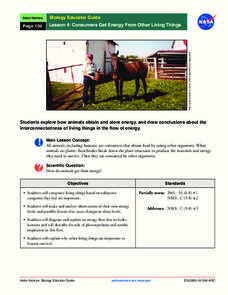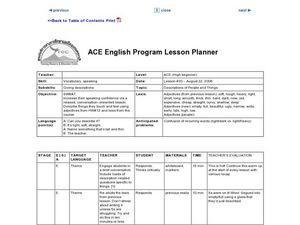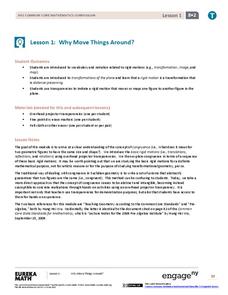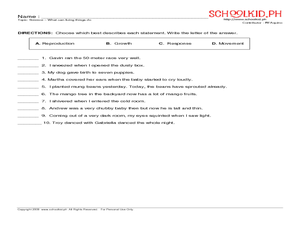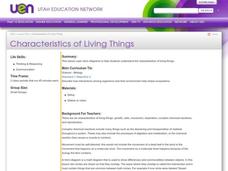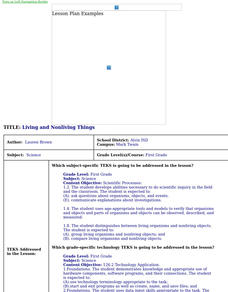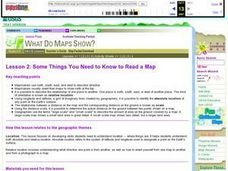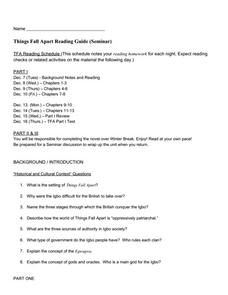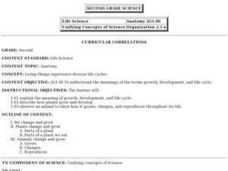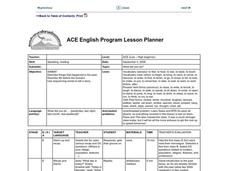NASA
Consumers Get Energy From Other Living Things
How do plants and animals get their food? Learn about where energy comes from, how animals store energy, and aerobic respiration, in a lesson that allows scholars to diagram energy flows.
Curated OER
Description of People and Things
Elementary schoolers use adjectives correctly in their speech. They demonstrate adjectives using familiar objects. (For example, they might show narrow by walking between two chairs placed closely together.) Then they play antonym Bingo...
Harper Collins
Every Thing On It Lessons and Activities
Honor the great poet, Shel Silverstein with eighteen activities and lessons showcasing his collection of poems from the book, Every Thing On It. Activities challenge scholars to rhyme words, make inferences, recite a poem, and...
EngageNY
Why Move Things Around?
Explore rigid motion transformations using transparency paper. Learners examine a series of figures and describe the transformations used to create the series. They then use transparency paper to verify their conclusions.
K12 Reader
The Best Thing I Do
Youngsters will boost self-confidence and practice narrative writing by describing one of the best things they do, whether it be a special talent, extracurricular activity, or a unique personality trait.
Curated OER
Science - What Can Living Things Do
In these living things worksheets, students write true or false for the sentences about living things. Students answer the questions about living things and choose the words that best describe the statements about living things.
Curated OER
Characteristics of Living Things
Students examine the characteristics of living things. They list the differences between living and non-living things, explore areas around the school, and create a Venn diagram for items found in the school areas.
Curated OER
Classifying Living Things
Students identify how to classify living things. They classify various concepts including family members, kinds of clothing, numbers, shapes, and vocabulary words. They discuss how to classify various concepts and classify pictures of...
Curated OER
Living and Nonliving Things
First graders distinguish between living and nonliving objects, and compare living organisms and nonliving objects.
Curated OER
My Favorite Thing
Students write about their favorite thing using all five senses, where possible.
Baylor College
Food Webs
Explore various ecosystems from around the world as your class discovers the interdependence of all living things. Using the provided sets of ecosystem cards, young scientists work in small groups building food webs to demonstrate the...
Curated OER
Feelin' Buggy
Students discuss five senses, compare and contrast human and insect senses, use adjectives to describe things they touch, smell, and see, and write stories in first person describing what it would be like to be size of insect.
Student Handouts
Ten Things I Learned This Year
As you approach the end of the school year or New Years Eve, encourage reflection amongst your class members and gain a quick glimpse into the content and ideas that they remember the most.
Curated OER
Describe Environmental Interrelationships
Students describe environmental interrelationships using list of criteria. They are able to explain organism interaction, based on definitions provided. Also, students can use references and worksheets, to describe effects of pollution...
Curated OER
Some Things You Need to Know to Read a Map
Students study things the you need to know to read a map and explain location.
Curated OER
Things Fall Apart Reading Guide
Chinua Achebe’s Things Fall Apart can present challenges even for experienced readers. Here’s a schedule and corresponding guide that will help readers focus on and record important events. The packet includes fact-based, interpretative,...
Curated OER
Living Things Experience Diverse Life Cycles
Second graders will study and explain the meaning of growth, development, and life cycle. They describe how plants grow and develop and observe an animal to show how it grows, changes, and reproduces throughout its life.
Curated OER
An Imaginary Creature And Then Using Describing And Action Words for a Creative Writing Exercise
You have to collect lots of materials (boxes, bags, toilet paper rolls, etc.) for this lesson to work successfully. After modeling how to create an imaginary creature out of the collection of recycled materials, let your class search...
Literacy Volunteers of Greater Hartford
Similes Activity using Jazz (featuring Duke Ellington)
Language learners get into the swing of things with a jazzy lesson about similes. They read an article about Duke Ellington, listen to samples of his music, and then try their hand at crafting similes to describe his improvisational and...
Curated OER
What Did You Do?
English learners practice using the past tense by participating in a time description activity. They identify the differences between verbs when they are used to describe current events or past events. Students answer questions using...
Curated OER
Descriptions with The Very Hungry Caterpillar
Explore famous artists of the Spanish-speaking world to practice describing things. The kids will identify the color each picture uses, whether figures are large or small, what the people look like, etc. Then, read The Very Hungry...
Curated OER
Things I'm Good At - Printing Practice
In this printing practice worksheet, students trace the dotted lines to print words or phrases that describe things that student can be good at. They write upper and lower case letters in words such as baseball, golf, and basketball.
Curated OER
Letter Sound and Letter Combination Accuracy: Sound Matching Adjectives
Kindergartenrs explore English by analyzing images in a picture book. This lesson on the parts of speech calls for young learners to view a picture book in class and describe characters, settings and objects with adjectives. Then, as a...
Curated OER
"Wheels, Wings and Other Things"
Students participate in various reading and writing activities related to the book "Wheels, Wings and Other Things" by Monica Hughes and Barbara Hunter. They participate in a shared reading activity, and write a new page for a book...
